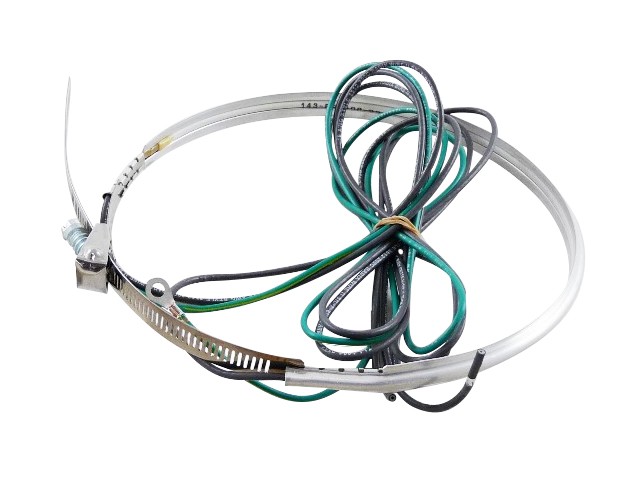Get Tech Tips
Subscribe to free tech tips.
Motor Service Factor

“Service factor” is an interesting motor rating that you will see on many motor data tags. It simply means how much additional “work” a motor can do or how much “load” it may be placed under for short periods of time without failure or overload.
For example, the FLA or full load amps of the motor above is 10.8 amps at 115 volts.
The service factor or S.F. is 1.5, making the service factor amps 16.2 (rounded down to 16 on the motor tag) at 115v because 10.8 x 1.5 = 16.2.
Don't confuse SFA with LRA (locked rotor amps). LRA is the current the motor will draw when the rotor is stationary, such as during startup. Service factor is simply a short-term “fudge factor” that the motor has for short periods of higher than normal load.
When a motor is running above its full load amps and in the service factor range, it may function, but its operational life will be shorter. It will also generally run at lower efficiency and power factor.
In other words, only go into the “service factor” range when necessary, not as a matter of normal operation.
—Bryan










Comments
This just helped me tremendously.
This just helped me tremendously.
Наш сервис способен найти данные по заданному профилю.
Укажите никнейм в соцсетях, чтобы сформировать отчёт.
Бот сканирует публичные данные и цифровые следы.
глаз бога тг
Информация обновляется в реальном времени с фильтрацией мусора.
Оптимален для анализа профилей перед сотрудничеством .
Конфиденциальность и актуальность информации — наш приоритет .
Наш сервис способен найти данные по заданному профилю.
Укажите никнейм в соцсетях, чтобы сформировать отчёт.
Бот сканирует публичные данные и цифровые следы.
глаз бога тг
Информация обновляется в реальном времени с фильтрацией мусора.
Оптимален для анализа профилей перед сотрудничеством .
Конфиденциальность и актуальность информации — наш приоритет .
Crafted watches remain popular for numerous vital factors.
Their timeless appeal and mastery define their exclusivity.
They symbolize achievement and refinement while uniting form and function.
Unlike digital gadgets, they endure through generations due to exclusive materials.
https://graph.org/The-Icons-of-Patek-Philippe-Beyond-Timekeeping-05-05
Collectors and enthusiasts treasure the engineering marvels that no digital device can match.
For many, owning one is owning history that transcends trends.
Crafted watches remain popular for numerous vital factors.
Their timeless appeal and mastery define their exclusivity.
They symbolize achievement and refinement while uniting form and function.
Unlike digital gadgets, they endure through generations due to exclusive materials.
https://graph.org/The-Icons-of-Patek-Philippe-Beyond-Timekeeping-05-05
Collectors and enthusiasts treasure the engineering marvels that no digital device can match.
For many, owning one is owning history that transcends trends.
Die Royal Oak 16202ST vereint ein 39-mm-Edelstahlgehäuse mit einem nur 8,1 mm dünnen Bauweise und dem neuen Kaliber 7121 für lange Energieautonomie.
Das blaue Petite-Tapisserie-Dial mit Weißgold-Indexen und Luminous-Beschichtung wird durch eine kratzfeste Saphirabdeckung mit blendschutzbeschichteter Oberfläche geschützt.
Neben Datum bei 3 Uhr bietet die Uhr 50-Meter-Wasserdichte und ein geschlossenes Edelstahlband mit Faltschließe.
Audemars Royal Oak 15450st armbanduhren
Die oktogonale Lünette mit verschraubten Edelstahlteilen und die gebürstete Oberflächenkombination zitieren den legendären Genta-Entwurf.
Als Teil der „Jumbo“-Linie ist die 16202ST eine Sammler-Investition mit einem Wertsteigerungspotenzial.
Die Royal Oak 16202ST vereint ein 39-mm-Edelstahlgehäuse mit einem nur 8,1 mm dünnen Bauweise und dem neuen Kaliber 7121 für lange Energieautonomie.
Das blaue Petite-Tapisserie-Dial mit Weißgold-Indexen und Luminous-Beschichtung wird durch eine kratzfeste Saphirabdeckung mit blendschutzbeschichteter Oberfläche geschützt.
Neben Datum bei 3 Uhr bietet die Uhr 50-Meter-Wasserdichte und ein geschlossenes Edelstahlband mit Faltschließe.
Audemars Royal Oak 15450st armbanduhren
Die oktogonale Lünette mit verschraubten Edelstahlteilen und die gebürstete Oberflächenkombination zitieren den legendären Genta-Entwurf.
Als Teil der „Jumbo“-Linie ist die 16202ST eine Sammler-Investition mit einem Wertsteigerungspotenzial.
Access detailed information about the Audemars Piguet Royal Oak Offshore 15710ST here , including pricing insights ranging from $34,566 to $36,200 for stainless steel models.
The 42mm timepiece boasts a robust design with selfwinding caliber and rugged aesthetics, crafted in stainless steel .
https://ap15710st.superpodium.com
Analyze secondary market data , where limited editions fluctuate with demand, alongside pre-owned listings from the 1970s.
Request real-time updates on availability, specifications, and resale performance , with trend reports for informed decisions.
Access detailed information about the Audemars Piguet Royal Oak Offshore 15710ST here , including pricing insights ranging from $34,566 to $36,200 for stainless steel models.
The 42mm timepiece boasts a robust design with selfwinding caliber and rugged aesthetics, crafted in stainless steel .
https://ap15710st.superpodium.com
Analyze secondary market data , where limited editions fluctuate with demand, alongside pre-owned listings from the 1970s.
Request real-time updates on availability, specifications, and resale performance , with trend reports for informed decisions.
High-end timepieces stay in demand for several key reasons.
Their craftsmanship and tradition distinguish them from others.
They symbolize prestige and elegance while merging practicality and style.
Unlike digital gadgets, they age gracefully due to their limited production.
https://pbase.com/amethyst9577/image/175490046
Collectors and enthusiasts respect the legacy they carry that no battery-powered watch can replace.
For many, collecting them defines passion that lasts forever.
High-end timepieces stay in demand for several key reasons.
Their craftsmanship and tradition distinguish them from others.
They symbolize prestige and elegance while merging practicality and style.
Unlike digital gadgets, they age gracefully due to their limited production.
https://pbase.com/amethyst9577/image/175490046
Collectors and enthusiasts respect the legacy they carry that no battery-powered watch can replace.
For many, collecting them defines passion that lasts forever.
If some one desires to be updated with hottest technologies therefore he must be pay a visit this website and be up to date everyday.
If some one desires to be updated with hottest technologies therefore he must be pay a visit this website and be up to date everyday.
Glad to hear it.
Glad to hear it.
To leave a comment, you need to log in.
Log In